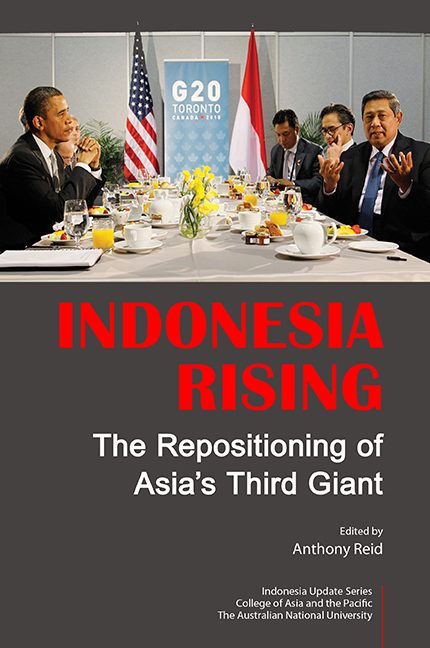Book contents
- Frontmatter
- Contents
- Tables
- Figures
- Contributors
- Foreword by Gareth Evans
- Preface
- Glossary
- 1 Indonesia's New Prominence in the World
- 2 Indonesia in the New World Balance
- 3 Indonesia's Role in the World Economy: Sitting on the Fence
- 4 Is Indonesia Rising? It Depends
- 5 Domestic Politics and International Posture: Constraints and Possibilities
- 6 Can Indonesia Lead on Climate Change?
- 7 Indonesian Muslims and Their Place in the Larger World of Islam
- 8 Indonesia's Quiet Springtime: Knowledge, Policy and Reform
- 9 Problems of Identity and Legitimacy for Indonesia's Place in the World
- Index
- INDONESIA UPDATE SERIES
9 - Problems of Identity and Legitimacy for Indonesia's Place in the World
Published online by Cambridge University Press: 21 October 2015
- Frontmatter
- Contents
- Tables
- Figures
- Contributors
- Foreword by Gareth Evans
- Preface
- Glossary
- 1 Indonesia's New Prominence in the World
- 2 Indonesia in the New World Balance
- 3 Indonesia's Role in the World Economy: Sitting on the Fence
- 4 Is Indonesia Rising? It Depends
- 5 Domestic Politics and International Posture: Constraints and Possibilities
- 6 Can Indonesia Lead on Climate Change?
- 7 Indonesian Muslims and Their Place in the Larger World of Islam
- 8 Indonesia's Quiet Springtime: Knowledge, Policy and Reform
- 9 Problems of Identity and Legitimacy for Indonesia's Place in the World
- Index
- INDONESIA UPDATE SERIES
Summary
‘Our foreign policy must be in accordance with our own internal strength.’
Ruslan Abdulgani (1957)Over the last half-century or so, the Republic of Indonesia has enjoyed some notable diplomatic successes in its international dealings. Among them can be counted its feat in 1949 in securing formal recognition of the sovereignty it had proclaimed over the territory of the former Netherlands Indies state on 17 August 1945; its capacity to bring early substance and energy to the yearnings of decolonizing nations for proper recognition and to assert their own unique role in international affairs; its success in securing recognition of its sovereignty over West Irian; its persistence and, eventually, astonishing success in securing international acknowledgment of its assertion of territorial rights over the waters of the archipelago; and its central role in the Cambodian peace process.
But it is fair to say that Indonesia – vast in size and large in population, gifted with immense natural resources and boasting a strategic political and economic location at the intersection of two continents and two oceans – has achieved much less in the international arena than might have been expected over the longer course of its modern history. Indeed, its influence in world affairs has for the most part been minimal. Dewi Fortuna Anwar (2010) has remarked that ‘it is sometimes said that Indo nesia is the most important country that the world knows least about’. Indonesia possesses little by way of threatening armaments (its army has generally played the role of a kind of neocolonial internal police force), has no energetic and influential diaspora, has no modern record of significant intellectual acknowledgment or athletic achievement, and has long had a subdued international diplomatic profile. In short, Indonesia has usually troubled the world – in the various meanings of that verb – very little. The world might have heard of Bali, or more vaguely of Krakatau or even of Jemaah Islamiyah, but it is seldom conscious of and knows little about Indonesia as either civilization or nation-state. The point of this essay is to explore the reasons, over time, for this continuing, sometimes embarrassing, sometimes debilitating – but at times useful – Indonesian failure of global projection and engagement.
- Type
- Chapter
- Information
- Indonesia RisingThe Repositioning of Asia's Third Giant, pp. 170 - 186Publisher: ISEAS–Yusof Ishak InstitutePrint publication year: 2012

